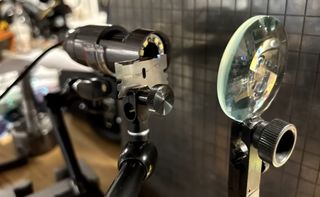
The Next Leap in AI Computing: Microsoft's Custom-Made Network Devices for Advanced Data Centers - Industry Update

Engineering the Impossible: How Ordinary Canned Air Reaches Supersonic Performance
Ordinary canned air products shoot out jets of gas with a surprising amount of vigor. A precision engineering and machining YouTuber,Cylo’s Garage , noticed telltale ‘shock diamonds’ in the stream emitted by his Staples-branded canned air and felt compelled to investigate further. Using a Schlieren imaging setup, the YouTuber managed to confirm that the humble air duster was pushing out a supersonic flow of gas (h/t Hackaday ).
Like many a fascinating discovery, Cylo’s Garage first noticed the supersonic jets emitted from the canned air nozzle by accident. Checking the air jet with a bright light in the background, confirmed that the Staples Electronics Duster was operational, but upon pulling the trigger fully the YouTuber noticed what looked like shock diamonds…
For some background, Cylo’s Garage explained that shock diamonds are a type of air pattern commonly visible in the trail of a supersonic jet or rocket. Overlapping shock and expansion waves interfere with one another to create the characteristic diamond shapes in the air. These are easy to see behind a jet or rocket, propelled by fuel combustion, with the light and dark areas in the wake of the engine representing waves of contrasting air density. However, this phenomenon seemed improbable coming from a jet of ordinary canned air with perhaps 70 PSI.

(Image credit: Cylo’s Garage)
About halfway through the video from Cylo’s Garage, we get to see how supersonic air speeds were confirmed using a rudimentary Schlieren imaging setup. All that was needed was a simple lens, a razor blade, an imaging sensor, and a light source. See this test setup, above. This admittedly “janky” set up more or less confirmed shock diamonds in the flow of gas from the can.
LATEST VIDEOS FROM tomshardware Tom’s Hardware
Pleased with the first quick experiment, Cylo’s Garage decided to refine the test method and apparatus. At six minutes in, we see a new set of test equipment put together with a far better lens and a columnated light source. From seven and a half minutes you can see the first air jets recorded using the new apparatus.
Image 1 of 4
(Image credit: Cylo’s Garage)
(Image credit: Cylo’s Garage)
(Image credit: Cylo’s Garage)
(Image credit: Cylo’s Garage)
In tests, the canned air soon ran out of pressure between bursts, but more consistent shock diamonds were pictured from the nozzle of an air compressor (90 PSI). However, the YouTuber’s favorite demo was delivered using the ball pump nozzle on the air compressor hose. Have a look through the gallery above for some of the great shock diamonds emitted from the canned air and various nozzles attached to a shop compressor.
Stay On the Cutting Edge: Get the Tom’s Hardware Newsletter
Get Tom’s Hardware’s best news and in-depth reviews, straight to your inbox.
Contact me with news and offers from other Future brands Receive email from us on behalf of our trusted partners or sponsors
By submitting your information you agree to theTerms & Conditions andPrivacy Policy and are aged 16 or over.
Also read:
- [Updated] 2024 Approved The Ultimate Guide to Cross-Platform Movie Capture
- [Updated] Cinema Journey IPhone Users' Best Choice for Films for 2024
- [Updated] GlobalScreen Top-Ranked Local & Live TV Streams
- [Updated] In 2024, Effective Methods for Responding to Negative YouTube Feedback
- [Updated] In 2024, Strategic Timestamp Use for Increased YouTube Traction
- Exploring the Features of the Asus BW-16D1X-U Blu-Ray Player: Attractive Build but Some Eccentricities Detected
- How to Remove MDM from iPhone 11 Pro?
- New 2024 Approved Top 10 AI Subtitle Translators for Content Creators That Anyone Can Use
- New How To Use Korean to English Video Translators for Creators
- Troubleshooting Lost Ark Startup Issues : A Comprehensive Guide
- Unfreeze, Reset, and Restore Shift Key
- Updated 2024 Approved 9 Best French Video Translators Online and Download Options
- Updated In 2024, A Complete Guide of Top 7 Video Language Translators
- Updated In 2024, Create Lip Sync TikTok Videos Without Installing Any App
- Updated In 2024, How To Translate Videos in Tamil for a Wider Reach
- Updated In 2024, Translate Videos Like a Pro with Subtitle Cat Your Essential Guide
- Title: The Next Leap in AI Computing: Microsoft's Custom-Made Network Devices for Advanced Data Centers - Industry Update
- Author: Peter
- Created at : 2025-03-01 19:00:45
- Updated at : 2025-03-04 02:39:11
- Link: https://ai-video.techidaily.com/the-next-leap-in-ai-computing-microsofts-custom-made-network-devices-for-advanced-data-centers-industry-update/
- License: This work is licensed under CC BY-NC-SA 4.0.
